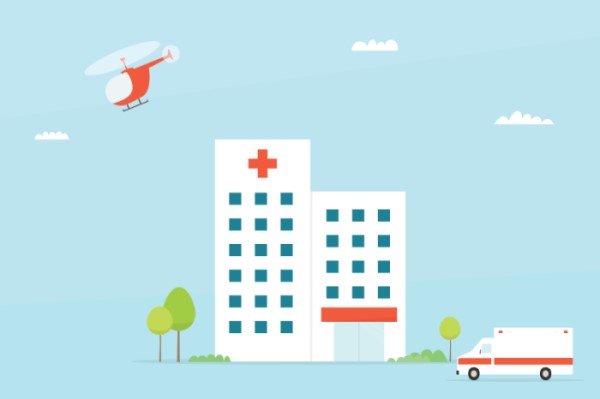ASOURCE®NAVI

公開日:2024.06.21
近年の医療技術の進歩と高齢化社会の到来により、地域における医療サービスの提供体制を再構築する必要性が高まっています。政府は、このニーズに応えるため「地域医療構想」と呼ばれる施策を打ち出しました。そこで今回は、地域医療構想の背景、狙い、病床機能分化の概要をまとめます。
日本が直面する人口減少と急速な高齢化の影響は、医療体制にも深刻な課題を投げかけています。国立社会保障・人口問題研究所の将来予測によれば、2040年には3人に1人以上が65歳以上の高齢者となり、これに伴って医療ニーズは大きく変化することが予測されています。政府はこの課題に対処するため、2014年に地域医療構想を打ち出しました。その目的は、入院医療から在宅医療への移行を円滑に進めながら、地域に密着した質の高い医療サービスを提供することです。近年、病床数の過剰供給や地域間の医療資源の偏在が深刻な問題となっていますが、この構想は将来の医療需要を踏まえ、各地域で適切な病床の機能分化と連携を図るものです。住民が自らの地域で必要な時に適切な医療を受けられるよう、切れ目のない一体的な医療サービスの提供を目指しています。この構想の理念は、限られた医療資源を効率的に活用し、持続可能な社会保障制度を構築することにあります。団塊の世代が75歳以上となる2025年を見据え、地域の状況に即した計画的な医療体制の整備が求められています。また、地域医療構想推進の取組みは、病床の削減や統廃合ありきではなく、各都道府県が地域の実情を踏まえ、主体的に進めるものとなっています。
地域医療構想の中核をなす考え方が、医療機関の「機能分化」の推進です。これは、医療機関からの病床機能報告等を活用し、病棟ごとに医療機能(高度急性期・急性期・回復期・慢性期)ごとに必要量を推計し、医療機能分化を推進するというものです。まず「高度急性期」は、手術、集中治療、緊急対応など、先端的で高度な医療を提供する機能を担います。救急医療をはじめ、がん/脳卒中/心疾患/重症外傷など、高度で複雑な治療を必要とする患者を受け入れ、迅速で手厚いケアを行います。一方、症状が落ち着いた「急性期」では、感染症や外傷、手術後の経過観察など、集中的な治療は必要ですが 、長期入院は必要としない患者を対象とします。状態が安定次第、適切な医療機関へ転院・転所するのが一般的です。そして「回復期」は、急性期の治療を終えた患者へのリハビリテーションを中心に担います。日常生活動作(ADL)の維持・向上を図り、在宅復帰や社会復帰をサポートする重要な役割があります。最後に「慢性期」は、寝たきりの方や認知症の方など、常に医療・介護が必要な長期入院患者への対応を行い、安心して長期間の療養生活が送れる環境を提供します。このように、患者の病態に最適な機能を持つ病床を選択することで、無駄のない効率的な医療サービスが実現できるというわけです。
一方で、病院には別の区分もあります。高度先端医療の提供や高度医療人材の育成を行う「特定機能病院」、地域の医療機関と緊密に連携しながら高度急性期・急性期医療を提供する「地域医療支援病院」があり、病院の役割分担が進められています。さらに大規模災害発生時には、救急医療の提供や患者受入れ、災害派遣医療チームの支援拠点としての機能を果たす「災害拠点病院」も位置付けられています。このように、地域全体で医療を支える体制が整備されつつあります。
地域医療構想を実現するためには、医療機関の開設主体によって、性質や運営方針、財源が異なることを考慮する必要があります。公的医療機関(国が設置する国立大学附属病院や都道府県や市町村が設置する自治体病院)、法人により開設された医療機関、個人開業の診療所など、多様な開設主体が存在します。これらの医療機関が適切に役割分担し、相互に連携することが重要です。
地域医療構想は、限られた医療資源を最大限活用し、住民が生活の場で質の高い医療サービスを継続的に受けられるよう、一貫したシステムの構築を目指す取組みです。医療ニーズの多様化に対応しつつ、将来にわたり持続可能な社会保障制度の実現に寄与することが期待されます。
メディアスグループは、医療機器の販売を中心とした事業を展開しています。医療に携わる私たち(Medical+us)は、医療現場や人々の健康的な明日へ役立つ情報をお届けする情報発信源(Media)の役割も果たしていきたいと考えています。